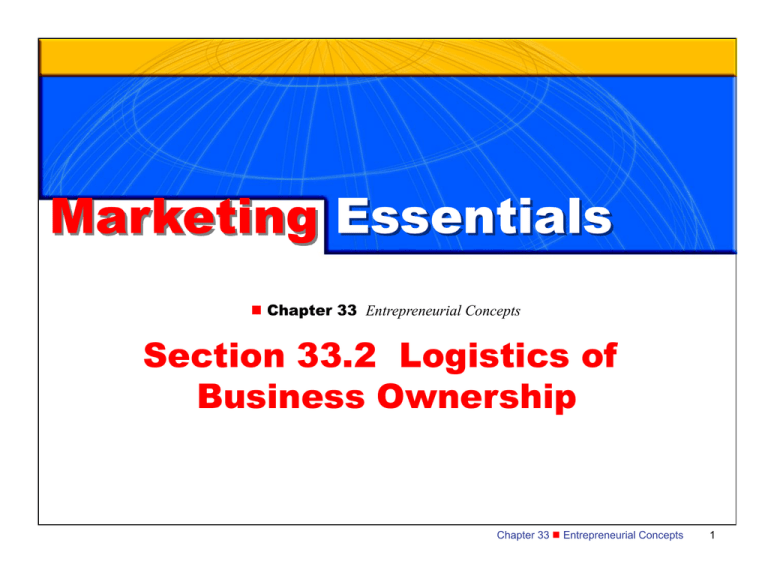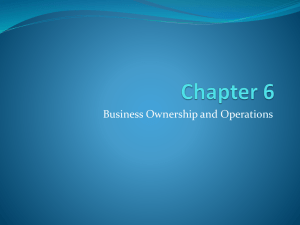Logistics of Business Ownership
advertisement

Marketing Essentials n Chapter 33 Entrepreneurial Concepts Section 33.2 Logistics of Business Ownership Chapter 33 n Entrepreneurial Concepts 1 SECTION 33.2 Logistics of Business Ownership What You'll Learn How to discuss business ownership opportunities How to identify forms of business ownership The legal steps to take in establishing a business Chapter 33 n Entrepreneurial Concepts 2 SECTION 33.2 Logistics of Business Ownership Why It's Important Considering whether and how to become an entrepreneur requires knowledge of the several forms of business organization, along with the legal steps for establishing a business. Chapter 33 n Entrepreneurial Concepts 3 SECTION 33.2 Logistics of Business Ownership Key Terms franchise corporation sole proprietorship stockholders unlimited liability foreign corporation partnership Subchapter S corporation general partnership DBA limited partnership Articles of incorporation Chapter 33 n Entrepreneurial Concepts 4 SECTION 33.2 Logistics of Business Ownership Business Ownership Opportunities About 150,000 businesses are started each year. There are four ways to enter business: develop a new business purchase a franchise business purchase an existing nonfranchise business take over the family business Slide 1 of 5 Chapter 33 n Entrepreneurial Concepts 5 SECTION 33.2 Logistics of Business Ownership Business Ownership Opportunities Starting Your Own Business This approach gives you many options. You can start the business of your choice, decide where to locate, and how to set it up. You do not have to take on bad debts, a bad reputation, |or a poor location. However, you must establish every aspect of your business and create and build a reputation. Slide 2 of 5 Chapter 33 n Entrepreneurial Concepts 6 SECTION 33.2 Logistics of Business Ownership Business Ownership Opportunities Purchasing an Existing Business When you buy a nonfranchise business, you usually receive little or no help from the previous owner. You must investigate why the business is being sold, examine the business records and the condition of the property and inventory, and determine the business's reputation. Slide 3 of 5 Chapter 33 n Entrepreneurial Concepts 7 SECTION 33.2 Logistics of Business Ownership Business Ownership Opportunities Purchasing a Franchise Business A franchise is a legal agreement to operate a business in the name of a recognized company. The franchisee buys a business operation from a franchisor, the owner of the recognized company. The franchisor does all business planning—management training, advertising, and merchandising. Most franchises are initially very expensive to operate. Slide 4 of 5 Chapter 33 n Entrepreneurial Concepts 8 SECTION 33.2 Logistics of Business Ownership Business Ownership Opportunities Taking Over the Family Business As with purchasing any existing business, you must review business records, the overall condition of the property and inventory, and determine the business's reputation. In addition, you need to explore potential conflicts and concerns with family members. Slide 5 of 5 Chapter 33 n Entrepreneurial Concepts 9 SECTION 33.2 Logistics of Business Ownership Forms of Business Organization The legal form of business organization you select may make the difference between business success and business failure. Your choices of business organization are: sole proprietorship partnership corporation Chapter 33 n Entrepreneurial Concepts 10 SECTION 33.2 Logistics of Business Ownership Sole Proprietorship A sole proprietorship—the most common form of business ownership—is owned and operated by one person. Example: Plumbers, auto mechanics, writers Advantages: Complete control, owner keeps all profits, easy to start, taxed less than other businesses Disadvantages: Unlimited liability—the owner is personally responsible for all debts and legal judgments Chapter 33 n Entrepreneurial Concepts 11 SECTION 33.2 Logistics of Business Ownership The Partnership A partnership is a legal agreement between two or more people to be jointly responsible for the success or failure of a business. A partnership is subject to relatively little regulation and is fairly easy to establish. There are two types of partnerships: general limited Slide 1 of 2 Chapter 33 n Entrepreneurial Concepts 12 SECTION 33.2 Logistics of Business Ownership The Partnership General Partnership Each partner shares in the profits and losses. Each partner has unlimited liability for business debts. Limited Partnership Each partner is liable for any debts only up to the amount of his or her investment in the company. One general partner has unlimited liability. Slide 2 of 2 Chapter 33 n Entrepreneurial Concepts 13 SECTION 33.2 Logistics of Business Ownership The Corporation A corporation is a business that is chartered by a state and legally operates apart from the owner(s). The value of a corporation is divided into equal units called shares of stock which are owned by stockholders. The company can own assets and borrow money without directly involving the shareholders. Slide 1 of 4 Chapter 33 n Entrepreneurial Concepts 14 SECTION 33.2 Logistics of Business Ownership The Corporation Corporations can be incorporated in any U.S. state. A foreign corporation is incorporated under the laws of a different state from the one in which it does business. A subchapter S corporation is a small business that is taxed like a partnership or proprietorship. Slide 2 of 4 Chapter 33 n Entrepreneurial Concepts 15 SECTION 33.2 Logistics of Business Ownership The Corporation There are four key advantages to corporations: The owners have limited liability. It is easier for a corporation to raise money for expansion. Stockholders can easily enter and leave the business. Each operation area of the business can be professionally managed. Slide 3 of 4 Chapter 33 n Entrepreneurial Concepts 16 SECTION 33.2 Logistics of Business Ownership The Corporation There are disadvantages to corporations: Formation is complex. Increased government regulation. Higher taxes on the profits of the corporation and on each stockholder. Accounting and record keeping are intricate. Slide 4 of 4 Chapter 33 n Entrepreneurial Concepts 17 SECTION 33.2 Logistics of Business Ownership Legal Steps in Establishing Your Business When you establish a sole proprietorship or partnership, you must file for a DBA (Doing Business As) at your local county clerk's office. This registers your business and protects your business name. When forming a corporation, you must file Articles of Incorporation with the corporation and securities bureau in your state department of commerce. Slide 1 of 2 Chapter 33 n Entrepreneurial Concepts 18 SECTION 33.2 Logistics of Business Ownership Legal Steps in Establishing Your Business Depending on what business you enter and where you locate, you may have to obtain one or more licenses. Individual states license doctors, attorneys, accountants, cosmetologists, barbers, marriage counselors, and pharmacists to protect the public from unqualified people and to maintain the health and welfare of the citizens. Slide 2 of 2 Chapter 33 n Entrepreneurial Concepts 19 33.2 ASSESSMENT Reviewing Key Terms and Concepts 1. What are four ways to enter into a business? 2. What are the three basic forms of business ownership? 3. What legal steps must you take to establish a sole proprietorship or partnership? 4. What legal steps must you take to establish a corporation? 5. What is a Subchapter S corporation? Chapter 33 n Entrepreneurial Concepts 20 33.2 ASSESSMENT Thinking Critically Which of the four ways to enter a business would you use to start your own business? Explain your decision. Chapter 33 n Entrepreneurial Concepts 21 33.2 Graphic Organizer Similarities and Difference Between Partnerships and Sole Proprieterships Similarities Shared decision making Increased diversity of experience Shared losses Combined funds Pride in owning and running business Easy to set up Low taxes Unlimited liability for debts Huge time demands Quicker decision making Owner keeps all profits Owner is own boss Relatively easy to get credit Chapter 33 n Entrepreneurial Concepts 22 Marketing Essentials End of Section 33.2 Chapter 33 n Entrepreneurial Concepts 23





